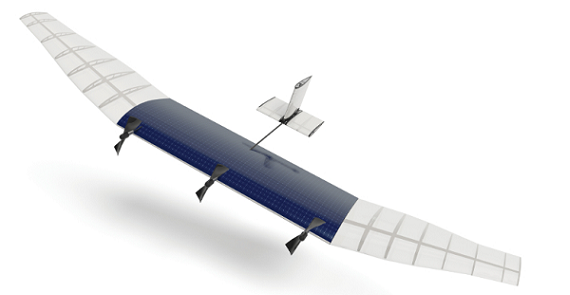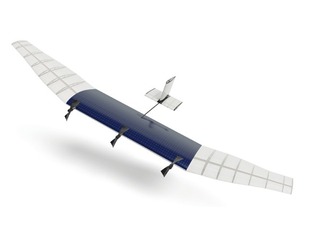
Facebook’s big thing these days is to get everyone online. It’s a somewhat controversial plan, but one that, I believe, will have big benefits for the world at large.
There are many ways it could do this. It could use satellites. It could use balloons, a la Google. But it looks like Facebook is most likely to go with the most obvious answer: drones.
Earlier this year Facebook revealed that its solar-powered drone, called Aquila, which it called a “high-altitude, long-endurance aircraft” was ready for testing. On Tuesday, there came another milestone: the drones are now ready to be tested in the real world, Mike Schroepfer, Facebook’s CTO, told attendees at the Web Summit in Dublin.
“A full-scale version of this aircraft is now fully constructed and we’ll be undergoing flight tests very, very soon,” he said.
Facebook had already revealed some details about Aquila, including that it has the wingspan of a 737 but weighs hundreds of times less, thanks to its unique design and carbon-fiber frame. Also, when deployed, it will be able to circle a remote region for up to 90 days, beaming connectivity down to people from an altitude of 60,000 to 90,000 feet.
Schroepfer also went into a bit more detail regarding how the drones actually connect people, explaining that the planes will receive broadband signals from the nearest city that has Internet service. The signal is then beamed up via laser and each Aquila plane will then be able to transmit and share the signals to any other plane in the network, thereby connecting other regions that do not yet have access.
There are challenges, of course, not the least of which is beaming the signal in the first place. The lasers, Schroepfer said, are aimed over 11 miles, the equivalent of laser pointer trying to hit something th size of a 10 cent euro coin.
There’s also the fact that the lasers have to deal with environmental conditions, such as heat, dust, and temperature differences, which all bend light.
Nonetheless, Facebook expects to be able to deliver tens of gigabytes, which is 10 times better than what currently exists.
Aquila is part of Facebook’s Connectivity Lab, which Facebook unveiled in March of last year, in order to develop new technology to “make affordable access to basic internet services available to every person in the world.”
All of this feeds into the Internet.org project, which was first announced in August of 2013, with the stated goals of making access more affordable, making the use of data more efficient and helping businesses drive access. The end result of the project being that it would connect the next five billion people on the planet to the internet.
The initiative has been criticized by people like Bill Gates for not doing more to help people with real problems, and accused by advocacy groups of violating net neutrality laws, of violating user privacy and of shutting down free expression.
In terms of numbers, though, Internet.org has been impressive. Mark Zuckerberg recently revealed that, so far, the project has brought an additional 15 million people online.
(Image source: theinquirer.net)
















